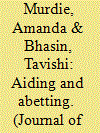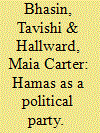| Srl | Item |
| 1 |
ID:
104040


|
|
|
|
|
| Publication |
2011.
|
| Summary/Abstract |
This article studies the effects of human rights international nongovernmental organizations (INGOs) on domestic antigovernment protest. Unlike mainstream scholarship, the authors argue that human rights INGOs are not simply the magic bullet in orchestrating nonviolent protests; different types of human rights INGO activity have varying effects on protest. Moreover, some human rights INGO activities may lead to higher levels of violent protest. The empirical tests use new data on the activities of over 400 human rights INGOs and domestic nonviolent and violent protest globally from 1991 to 2004. The authors find that increases in human rights INGO activities reflecting a greater commitment to the domestic population are associated with higher levels of both violent and nonviolent protest.
|
|
|
|
|
|
|
|
|
|
|
|
|
|
|
|
| 2 |
ID:
158098


|
|
|
|
|
| Summary/Abstract |
Existing research on the relationship between political trust and political participation has generated mixed results. In pursuit of a better explanation of this relationship, we argue that trust in institutions has varying effects on participation for minority and majority groups. In this paper, we analyze Turkish and minority attitudes toward Turkish institutions. We find strong support that trust in institutions affects majority and minority political participation differently. These results highlight the divergent processes at work in the relationships between political trust and political participation across majority and minority citizens in Turkey due to their varied experiences with these institutions. Some of our most interesting findings show that minorities, unlike citizens from the majority group who have higher trust in police, are more likely to protest, and minorities with trust in political parties are actually less likely to join these parties. We explain these surprising findings within the context of Turkey’s post-armed conflict political context.
|
|
|
|
|
|
|
|
|
|
|
|
|
|
|
|
| 3 |
ID:
120320


|
|
|
|
|
| Publication |
2013.
|
| Summary/Abstract |
Why do violent movements participate in elections? To answer this question, we examine Hamas's formation of the Reform and Change Party and its iconic victory in the 2006 elections to the Palestinian Legislative Council. We argue that Hamas's formation of this party was a logical step, following nearly two decades of participation in local and municipal elections. Hamas's need to attract resources from external donors, who make funding decisions based on civilian support for the movement, best explains why Hamas decided to participate in local elections in the early 1990s, taking Hamas on a path that eventually led to its 2006 legislative victory. Hamas's foray into elections was consistent with its dual strategy of directing violence against Israel and building Palestinian support through welfare services. We demonstrate that changes in political opportunities (Fatah's decline and the increase in Hamas's popularity), institutional incentives (lax electoral laws and the holding of municipal elections), and the rise of moderate voices within Hamas explain the timing of its entry into legislative elections. Finally, we discuss Hamas's electoral victory, the need for cooperation between Fatah and Hamas, and the role played by international actors as significant factors influencing prospects for peace and democratization in the region.
|
|
|
|
|
|
|
|
|
|
|
|
|
|
|
|